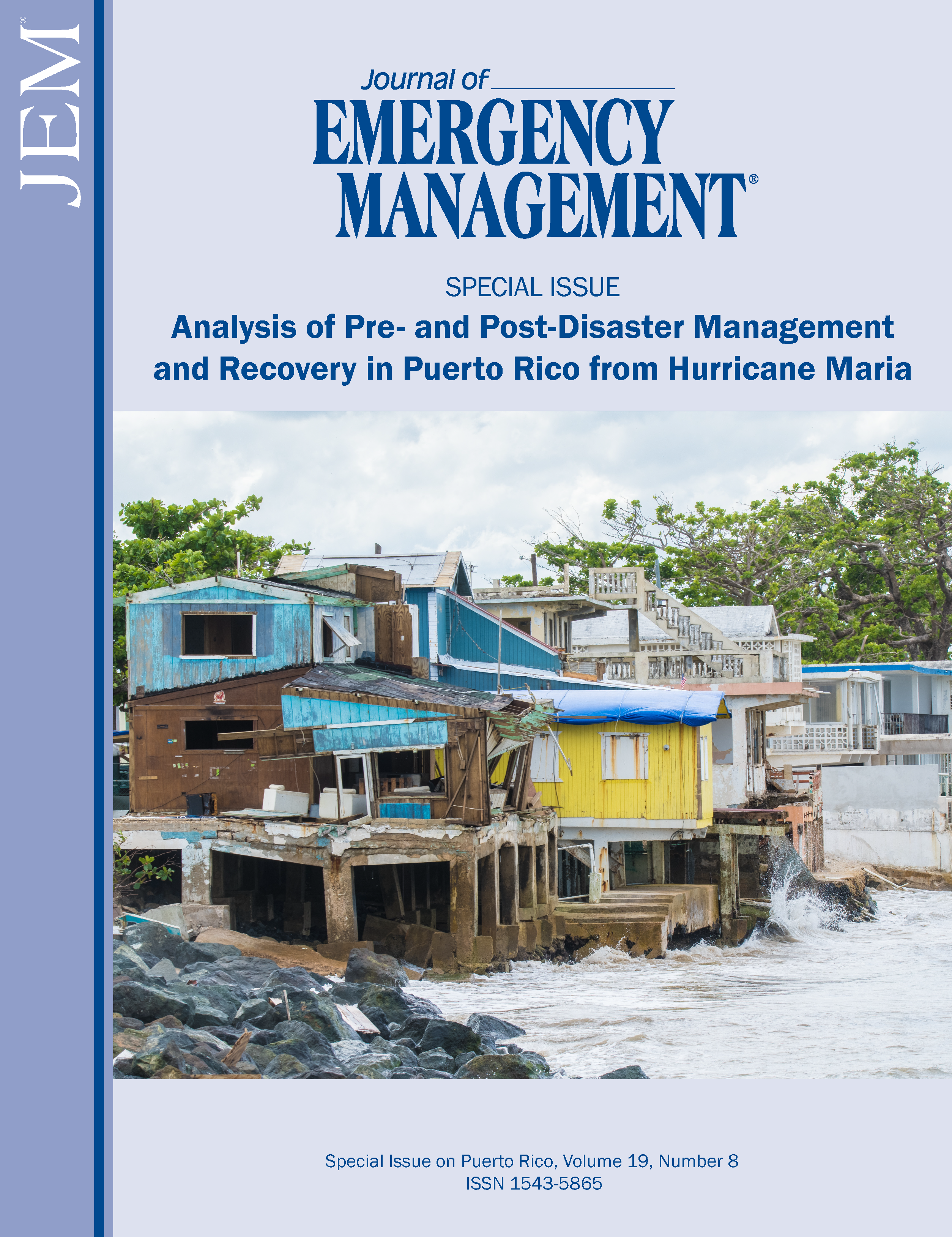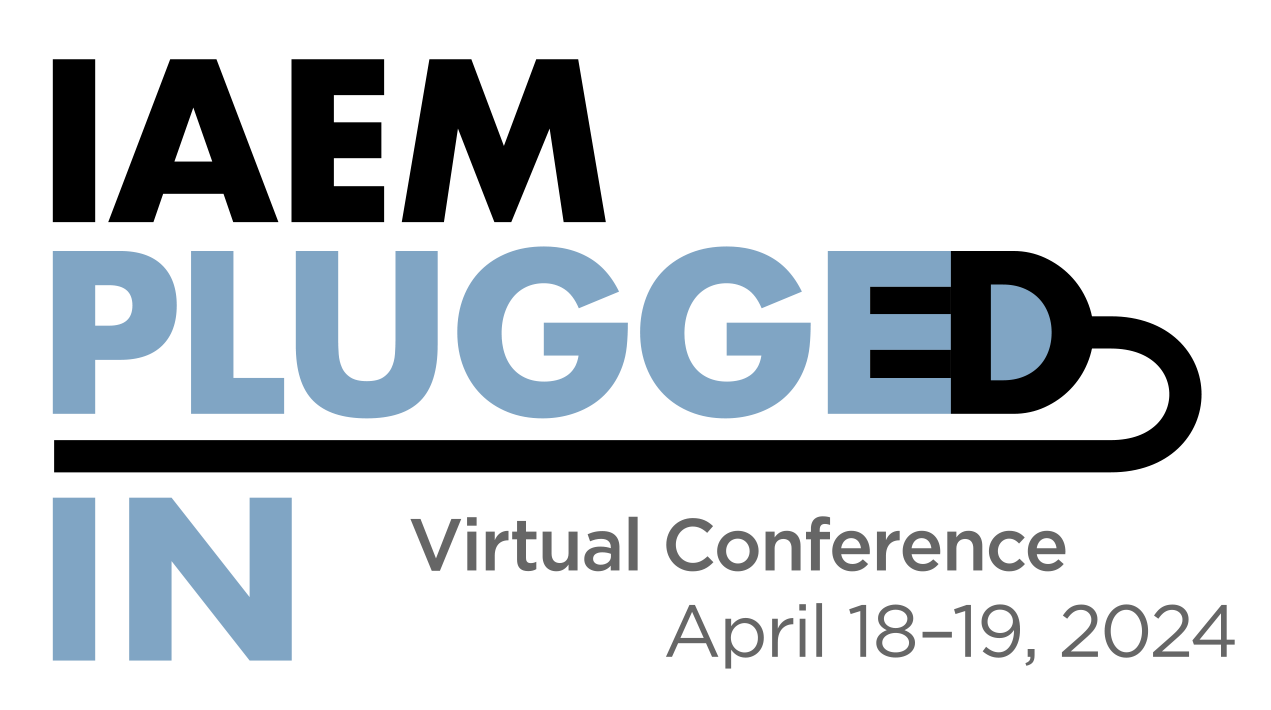Provision of mental health services immediately following a natural disaster: Experiences after Hurricane Maria in Puerto Rico
DOI:
https://doi.org/10.5055/jem.0634Keywords:
hurricane, natural disaster, disaster mental health response, psychological first aidAbstract
Objective: The increased risk of mental health disorders in the months and years following a natural disaster highlights the need for more immediate preventive intervention. The objective of the current study was to learn from a real-time implementation of a natural disaster response following the Hurricane Maria in Puerto Rico to identify strategies for providing mental health services immediately after a natural disaster.
Methods: Two focus groups were held with faculty (n = 6) and graduate students (n = 4) from a graduate psychology program at the Universidad Carlos Albizu, Centro Universitario Mayagüez. An additional key informant interview was conducted with two faculty member participants. Data were analyzed qualitatively using thematic analysis.
Results: The delivery of mental health services was organized into three major themes: (1) finding a way to communicate, (2) targeting key access points for outreach and centralization of resources, and (3) providing triaged mental health care based on level of need.
Conclusions: Findings are used to guide recommendations for mental health response preparation in future natural disaster contexts.
References
Pasch RJ, Penny AB, Berg R: National Hurricane Center Tropical Cyclone Report: Hurricane Maria, 2018. Available at https://www.nhc.noaa.gov/data/tcr/AL152017_Maria.pdf. Accessed September 12, 2019.
Kishore N, Marques D, Mahmud A, et al.: Mortality in Puerto Rico after Hurricane Maria. N Engl J Med. 2018; 379(2): 162-170.
Orengo-Aguayo R, Stewart RW, de Arellano MA, et al.: Disaster exposure and mental health among Puerto Rican youths after Hurricane Maria. JAMA Netw. 2019; 2(4): 1-10.
Ferré IM, Negrón S, Shultz JM, et al.: Hurricane Maria’s impact on Punta Tantiago, Puero Rico: Community needs and mental health assessment six months postimpact. Disaster Med Public Health Prep. 2018; 13(1): 18-23.
Seballos F, Tanner T, Tarazona M, et al.: Children and Disasters: Understanding Impact and Enabling Agency, Brighton, England: Institute of Development Studies. 2011.
Bonanno GA, Brewin CR, Kaniasty K, et al.: Weighing the costs of disaster: Consequences, risks, and resilience in individuals, families, and communities. Psychol Sci Public Interes. 2010; 11(1): 1-49.
La Greca AM, Silverman WK: Treatment and prevention of post-traumatic stress reactions in children and adolescents exposed to disasters and terrorism: What is the evidence? Child Dev Perspect. 2009; 3(1): 4-10.
Brymer MJ, Jacobs A, Layne CM, et al.: Psychological First Aid: Field Operations Guide. 2nd ed. National Child Traumatic Stress Network and the National Center for PTSD, 2006.
Hobfoll SE, Watson P, Bell CC, et al.: Five essential elements of immediate and mid-term mass trauma intervention: Empirical evidence. Psychiatry 2007; 70(4): 283-315.
Berkowitz S, Bryant R, Brymer M, et al.: Skills for Psychological Recovery. Washington, DC: National Center for PTSD and the National Child Traumatic Stress Network, 2010.
Harris D, Wurie A, Baingana F, et al.: Mental health nurses and disaster response in Sierra Leone. Lancet Glob Heal. 2017; 6(2): e146-e147.
Miles MB, Huberman AM, Saldana J: Qualitative Data Analysis: A Methods Sourcebook. 3rd ed. Los Angeles, CA: Sage Publications, Inc., 2014.
Friese S: ATLAS.Ti 7 User Guide and Reference. Berlin: ATLAS. ti Scientific Software Development GmbH, 2013.
Palinkas LA, Horwitz SM, Green CA, et al.: Purposeful sampling for qualitative data collection and analysis in mixed method implementation research. Adm Policy Ment Heal. 2016; 42(5): 533-544.
Jonsen K, Jehn KA: Using triangulation to validate themes in qualitative studies. Qual Res Organ Manag An Int J. 2009; 4(2): 123-150.
Houston JB: Public disaster mental/behavioral health communication: Intervention across disaster phases. J Emerg Manag. 2012; 10(4): 283-292.
Hugelius K, Gifford M, Örtenwall P, et al.: Disaster radio for communication of vital messages and health-related information: Experiences from the Haiyan Typhoon, the Philippines. Disaster Med Public Health Prep. 2016; 10(4): 591-597.
Hugelius K, Gifford M, Örtenwall P, et al.: “To silence the deafening silence”: Survivor’s needs and experiences of the impact of disaster radio for their recovery after a natural disaster. Int Emerg Nurs. 2016; 28: 8-13.
Bryson JM, Crosby BC, Stone MM: The design and implementation of cross-sector collaborations: Propositions from the literature. Public Adm Rev. 2006; 66: 44-55.
Simo G, Bies AL: The role of nonprofits in disaster response: An expanded model of cross-sector collaboration. Public Adm Rev. 2007; 67: 125-142.
Orengo-Aguayo R, Stewart RW, de Arellano MA, et al.: Implementation of a multi-phase, trauma-focused intervention model post-Hurricane Maria in Puerto Rico: Lessons learned from the field using a community based participatory approach. J Fam Strengths 2019; 19(1): 1-41.
Orengo-Aguayo R, Stewart RW, Martínez González KG, et al.: Building collaborative partnerships across professions to implement trauma-focused cognitive behavioral interventions after Hurricane Maria in Puerto Rico. Behav Ther. 2019; 42(4): 123-126.
Published
How to Cite
Issue
Section
License
Copyright 2007-2023, Weston Medical Publishing, LLC and Journal of Emergency Management. All Rights Reserved








